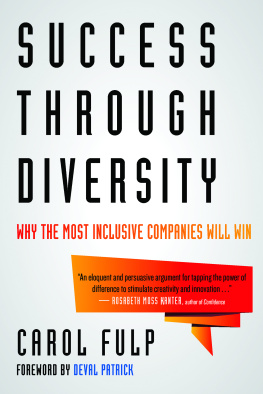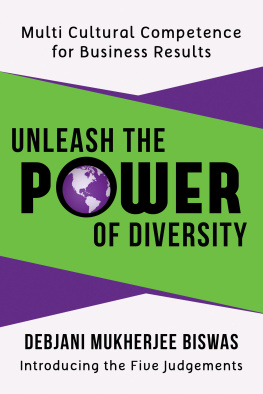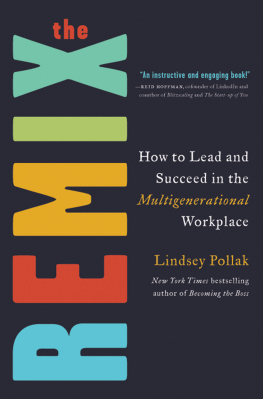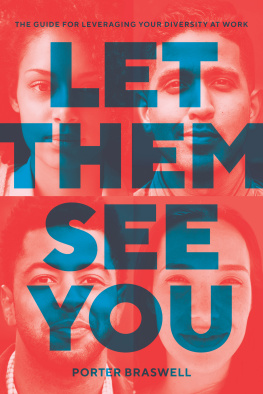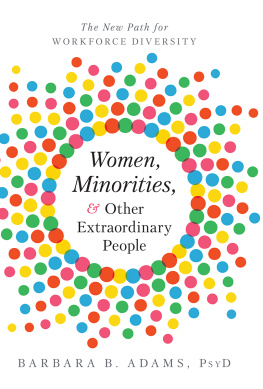Table of Contents
Pagebreaks of the print version
Guide

To all of the business and organizational leaders
who are committed to a more diverse workplace in America
FOREWORD
OUTSIDE OF LAMONT LIBRARY in Harvard Yard sits a large brass statue by famed British sculptor Henry Moore. Up close, its unremarkable: a bunch of lumpy golden shapes where small children often climb. But walk out of the Yard by way of Quincy Street, take a sharp left, and gaze back through the railing about fifty yards down the block. Suddenly you will see a gorgeous and voluptuous work, once meaningless metal transformed into a majestic human figure in repose. For Jeremy Knowles, late professor of chemistry and longtime dean of Harvards Faculty of Arts and Sciences, this experience contained a powerful lesson for incoming students. If they didnt understand a scientific theory, a passage from a classical text, a Schoenberg trio, or their roommates politics, Dean Knowles would tell the freshmen, try a new perspective.
Dean Knowless story might seem quaint today, as our college campusesnot to mention our political partiesgrow ever more polarized, unyielding, and rancorous. But his wisdom is timeless. There is a transformative power in trying a different perspective. Surely, it is the source of both understanding and progress.
I grew up in the tough neighborhood of Chicagos South Side, where poverty and crime were much too familiar. At age fourteen, with the blessing of a full scholarship, I was jettisoned to Massachusetts to the world of Milton Academy, then on to Harvard Collegeworlds of manicured lawns, ivoried towers, and the advantages of wealth and privilege. After graduating from Harvard, my perspective was again upended by a year living and working in Sudan on a Michael Clark Rockefeller Traveling Fellowship, where I exchanged manicured lawns and hoary traditions for arid desert, the ordered chaos of the souk, and subsistence living. All that before I entered the professional world back in the States.
My early experiences exposed me to some of the vagaries and injustices that divide us, and the many yearnings we have in common. But above all they taught me the power of seeking perspective. And that perspective has, among other things, enabled me to sustain my own high expectations of myself and others, and my drive to perform and leave whatever I can better. This very spirit of optimism infuses my friend Carol Fulps book.
As youll discover in these pages, Dean Knowless lesson is a point of departure. She teaches that we must assume different perspectives to understand one another, and we must also celebrate these differences and strategically mobilize them to forge a better future. Our workplaces must encompass and nurture a broad spectrum of human difference if they are to overcome the forces of market disruption and flourish. In the chapters that follow, youll learn how we must harness the power of differencebe it racial, gender, class, perspectiveto power our companies marketing capacities, innovative potential, recruitment possibilities, and performance. While corporate greed and malfeasance may dominate the news headlines, this book reminds us that our most admired companies harness the power of difference to create innovative, vibrant, and dynamic organizations.
Success Through Diversity: Why the Most Inclusive Companies Will Win tells how we can do well by doing right.
Deval L. Patrick
Governor of Massachusetts (20072015)
Bain Capital Managing Director (2015present)
INTRODUCTION
AT A CIVIC EVENT YEARS AGO , as a young African American just starting out in my career, I had a chance to sit next to Jim Coppersmith, then the president of Bostons ABC-TV affiliate, WCVB. I struck up a conversation with the personable white CEO and advised him that I was serving as the fund-raising chair for a valued African American social service nonprofit. Our organization, I related, would welcome CEOs at our civic events, as we were trying to garner support from the business community. Unfortunately, we werent having much luck appealing to corporate executives. I had assumed that CEOs werent interested in our cause or that they perhaps felt uncomfortable attending events where most attendees were people of color.
You know, I said to Jim, were having a fund-raiser soon. Why dont you come?
Smiling, Jim said, You always hold your fund-raisers on weekends. If you want CEOs, you should hold your events during the week. Then Id happily come and help bring my colleagues. He advised me that scheduling issues had prevented him and probably some others from attending in the past. Weekends were when they preferred to spend time with their families and friends, not attend to civic activities related to their corporate roles.
I began to schedule fund-raising events on weekdays. Sure enough, with Jims help, business executives began coming. I never would have learned about the importance of weekday scheduling had I not had a frank conversation with a white CEO. And that was only the beginning. Within a year, this same CEO hired me when the human resources manager position at WCVB came open.
If youre trying to raise money, land a job, or achieve some other professional goal, interacting with people who are different from you will prove valuable. The cultivation of difference helps organizations too. During the 1980s, when I worked at WCVB, I found the station to be decades ahead of most businesses in the country when it came to difference. The entire organization, including management, didnt simply tolerate people from diverse backgrounds. It valued difference. Delivering on its charter, WCVB was a true community station that served all of Bostons neighborhoods, ethnicities, and religious groups. Members of all communities were represented on the organizations staff and its on-air programming. And the stations award-winning show CityLine, hosted by well-respected director of public affairs and community services Karen Holmes Ward, an African American media veteran, today continues to serve as the voice of Bostons diverse communities.
Whenever I go on a job interview, I arrive early to watch people and learn about the organizations culture. When I arrived at WCVB for my initial interview, I spotted a man wearing pink fuzzy slippers. He seemed completely at ease and happy at work, as did his colleagues around him. Can you imagine what it meant to an African American woman during the 1980s to see a man in the workplace wearing pink fuzzy slippers? If WCVB could welcome a man who dressed in such an unorthodox fashion, I felt it would embrace my difference as well.
It was such a contrast to an experience I had while interviewing for a community relations manager position at a financial services institution. There, my three interviewers were all tall white men with blue eyes and blond hair, dressed in blue pin-striped suits. It was clear that they represented the institutions picture of success, and that this picture didnt look like me. At Channel 5, however, I saw people of color, women, those with physical disabilities, and, of course, my favoritethe man with pink fuzzy slippers, who attended to his work as I waited in the reception area. During those fifteen minutes prior to the interview, I observed a culture in which individuality, creativity, difference, and even eccentricities were accepted, fostered, and prized. I knew immediately that I could do my best work in this environment. Sure enough, when I came on board, I found that WCVB wholeheartedly valued me not only for my job skills, but for the unique perspectives I brought. In fact, my colleagues viewed my difference as an asset.

